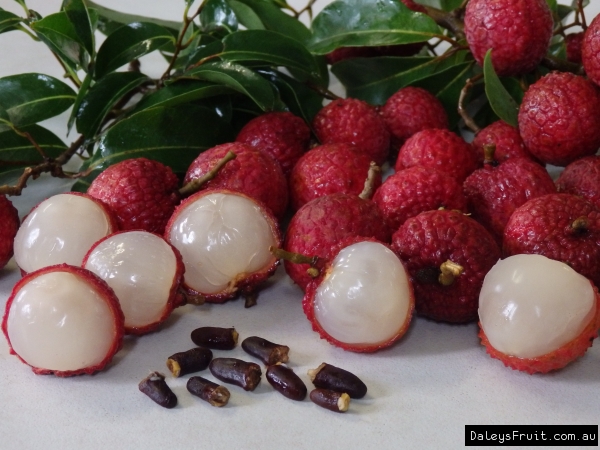Lychees Are Healthy When in Season

Lychees Are Healthy When in Season
Lychees are the perfect tropical fruit for you to enjoy during summer. They’re white and sometimes pink, and they have a distinctive, tropical taste. They’re pack with many nutrients and are particularly high in Vitamin C and Potassium. In addition to being tasty, they’re also good sources of antioxidants, Potassium, and copper. To learn more, read on! And don’t forget to try them when they’re in season!
Vitamin C
The lychee is a monotypic taxon and the only member of the genus Litchi in the soapberry family Sapindaceae. Its fruit is rich in vitamin C and other nutrients, and is often refer to as a “superfood”.Lychees are rich in vitamins A and C, and have antioxidant properties that support the immune system. Lychees contain a significant amount of vitamin C, which works to fight free radicals and bacteria. In addition to vitamin C, lychees also contain other nutrients that help strengthen the immune system and prevent disease. While these benefits make lychees a delicious treat, they are not enough to keep you healthy!
Vitamin C in lychees prevents premature aging of the skin. It contains phyto-nutrients call flavonoids and Vitamin B-complex. They protect the body from oxidative stress cause by UV radiation and pollution. Free radicals are molecules of oxygen that alter a cell’s function and can even cause cancer. Antioxidants neutralize these free radicals and protect skin cells. This helps hair grow faster.
Other health benefits of lychees include a reduce risk of developing cancer, improve digestion, better skin, and lower blood pressure and also Fildena 200 mg reduces the risk of blood pressure. Moreover, lychees are a rich source of fiber, which helps improve bowel movement and securing the daily journey through the digestive tract. These fibers also help regulate the metabolism and stimulate gastric juices. These benefits make lychee a fantastic fruit for anyone.
Potassium
One of the most nutritious fruits in the world, lychees are pack with antioxidants and beneficial for the body. The fruit’s high water content and potassium content help flush toxins out of the body. They are a great source of energy and boost your stamina. Additionally, they contain a variety of B vitamins, including folate and niacin. These essential vitamins and minerals are necessary for healthy blood pressure. Lychees contain high levels of Vitamin C and fiber, which help regulate bowel movements and keep the colon clean. The antioxidant properties of lychees also help to prevent acne and control the growth of dark spots.
Apart from being high in fiber and low in calories, lychees are also a great source of potassium and copper. These nutrients help to regulate blood pressure and prevent anemia. Also, they are pack with B-complex vitamins, which help in the metabolism of carbohydrates, proteins, and fats. They also help prevent premature aging by combating oxidative stress and UV radiation. As a result, Lychees are a great source of protection against aging.
The high levels of dietary fiber in lychees support a healthy digestive system and reduce the risk of cardiovascular disease and diabetes. In addition to this, the potassium in lychee helps regulate blood pressure and prevent muscle cramps. Lychees also contain copper, an essential mineral that helps form RBCs and enhance blood circulation. These benefits are also support by lychees’ bioflavonoid content. Rutin is an anti-inflammatory that strengthens blood vessels and can help heal hemorrhoids and varicose veins.
Antioxidants
The fruit is a good source of antioxidants and plant compounds, including epicatechin. This plant compound considere a dietary supplement and helps prevent cancer, heart disease, and diabetes. Lychees are also high in potassium and copper, making them a decent source of these minerals. Lychees are also a great source of antioxidant plant compounds, especially proanthocyanidins.
Research has shown that lychees contain a high concentration of vitamin C, a key antioxidant that protects the immune system. In addition to strengthening the immune system, vitamin C also fights infection and illness. In fact, a 2006 study shows that vitamin C can help shorten the duration of the common cold. Antioxidants such as flavonoids and anthocyanins are found in the fruit, and just one lychee can provide up to 226 percent of the daily recommende amount of vitamin C.
In addition to antioxidants, lychees contain fiber and other micronutrients. It also contains trace amounts of copper, manganese, selenium, zinc, and calcium. The water-soluble vitamin C in lychee doubles as an antioxidant, which helps your immune system maintain a healthy level. Lychees are good for your immune system, and they help you get over an infection quickly.
Copper
A tropical fruit that is rich in antioxidants and vitamins, lychees are good for your health when they’re in season. This fruit, also known as a litchi, is a small, round fruit with a red scaly skin surrounding a fleshy white aril and one large seed. These fruits have been popular in China and Southeast Asia for centuries, and their sweet flavor is popular in many desserts and drinks. They are often sold as a dessert, and you can also make lychee wine, which is a delicious treat.
Lychees are rich in antioxidants, which protect the body against free radicals, and provide a variety of health benefits. The fruit is also a good source of Vitamin C, which helps the immune system fight off diseases and maintain a youthful appearance. It also contains Vitamin D, which helps your skin stay healthy. And because lychees contain so much water, you can eat them in season to keep hydrated during hot weather.
The Lychee fruit is a sweet and tart summertime fruit native to Southeast Asia. Their flesh is semi-translucent and incredibly juicy. The fruit’s sweet and berry-like taste is often attributed to floral undertones in the fruit. Lychees are best eaten when they are red, but are OK when they have some brown spots. However, if you can find a fruit that is red, that’s even better.
Blood sugar
You can lower blood sugar by consuming lychees. This Asian fruit is packed with anti-diabetic properties. The polyphenol oligonol found in lychee seeds reduces insulin resistance and is also said to be beneficial in fighting oxidative stress and inflammation. It is important to note that the amount of sugar found in lychees is 29 g. You should therefore consult a qualified healthcare professional to determine whether eating lychees is safe for you.
Lychees are packed with antioxidants and vitamins. As a member of the soapberry family, lychees are a delicious fruit that is very popular in Southeast Asia. Though they are high in calories due to the high concentration of sugar, they are considered healthy by many people with diabetes. Fildena 100 mg boosts the immune system and keeps you healthy and prevents infection. As fructose does not require insulin for metabolism, litchis are safe for diabetics. However, they must be eaten in moderation if you are diabetic.
The fruit is also rich in antioxidants and Vitamin C. Vitamin C acts as an anti-inflammatory and lowers inflammation. It helps prevent various lifestyle diseases, such as cardiovascular disease, and it boosts overall immunity. It is a great choice for diabetics. However, it is important to note that eating unripe lychee can have negative effects on blood sugar levels, especially in children who are undernourished.
Hypoglycin
The research indicates that the high content of hypoglycin in ripe larch trees can lead to severe vomiting and an ailment known as Jamaican vomiting sickness. The fruit contains the toxin hypoglycin, which prevents the body from synthesizing glucose and causes seizures and unconsciousness. However, not all lychees contain this toxin.
The problem is that most Western consumers are well-fed and have little need for sunripe lychee. This is why the fruit is expensive and imported. In addition to high prices, fewer people consume lychees. Those who do eat the fruit should be aware of these facts. It’s also important to know that the fruits can be deadly when unripe.
Researchers at the Martin Luther University Halle-Wittenberg have also confirmed that hypoglycin is present in lychee fruit. This toxin can be dangerous for people and animals. Although the National Lychee Center has denied the link, independent researchers have shown that the toxin can be present in lychees that have not yet been ripe. Moreover, the lychee fruit contains methylene cyclopropyl-glycine, which is the same as the toxin found in maple trees.






